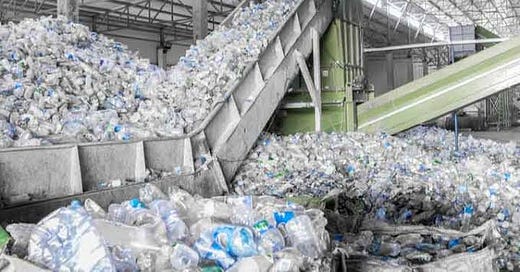Polluting plastics, carbon, cancers: the painful results of recycling plastic
While nations try to recycle plastic, hoping to mitigate plastic pollution,facts on the ground say this isn't the answer
Plastic recycling process, Credit, Research Dive
Earlier in the week, reports emerged that worldwide only nine percent of plastic waste gets recycled, with the rate for the United States now five percent, as facilities for plastic sorting have microplastics of five millimeters sloughing into plant waste waters.
In a Greenpeace report, only five percent of plastic waste gets recycled into new products, with no plastic waste meeting the threshold to be called recyclable according to standards set by the Ellen MacArthur Foundation New Plastic Economy Initiative, which stipulated that plastic waste should have a recycling capacity of 30 percent.
In still another report, only about five percent of plastic waste got recycled in the United States in 2021, down from a high of 9.5 percent in 2014, when millions of tonnes of plastic waste sent to China got counted as recycled.
In other words, only a few percentage of plastic waste gets recycled worldwide, and this causes alarm, with the global plastic waste set to almost triple by 2060, around half ending up in landfills and less than a fifth recycled, with almost two-third of the waste from short-lived items such as packaging, low-cost products, and textile.
Many see plastic recycling as a failure, because since 1950, the world created about 8.3 billion tonnes of plastic waste, recycled less than nine percent, meaning 91 percent of waste have never been recycled, lots of the waste in landfills or the world's oceans.
Many see plastic recycling as a failure, because since COVID-19, products made from plastic waste prove to be more expensive compared to drink bottles, the most common recycled plastic, with the recycled plastic products costing 83 percent to 93 percent more than new plastic products.
Many see plastic waste recycling as a failure, because companies such as Unilever, Renewlogy, Enerkem, and others claimed to have the technology capable of handling all types of waste, including takeout containers and cling wraps, but their efforts end in futility, due to the uncertainty about the projects’ ability to secure reliable waste and to turn a profit.
Many see plastic waste recycling projects as not worth it, because uncertainty exists about the project's ability to turn a profit, and because products based on recycled plastic waste end up more expensive to the ones made from new plastic, and because 91 percent of plastic waste produced in the past seventy-three years still remain not recycled, and because manufacturers find it difficult to scale up the plastic recycling process without incurring huge losses.
During the plastic waste recycling process, the microplastics tally assumes astronomical proportions, and when they undergo filtering, the entire discharge from the numerous waste total into 75 billion particles per cubic meter of waste water, thereby harming the environment.
Though efforts at plastic waste recycling emerged in the past as a response to the global explosion of plastic waste, but because the cost of recycling assumes astronomical proportions and no cheap way exists to carry it out, more than 90 percent of the waste from the process gets dumped or incinerated, compounding the already dangerous issue of plastic waste explosion.
After China banned plastic waste imports, the issue of recycling plastic waste assumed astronomical proportions, because nations such as Turkey became recipients of some of the waste at nearly 450,000 tonnes in 2020, making residents near recycling facilities to inhale toxic gas and get exposed to the risk of developing significant life-long health conditions, including cancers and reproductive system harms.
Since the process of melting down and recycling plastic waste creates volatile organic compounds, the endeavor brings problems that assume astronomical proportion through the generation of carbon emissions, which contribute to global warming, predicted to make temperatures to hit 1.5 degrees Celsius above the 1850-1900 average by 2033 and two degrees Celsius around 2060.
The globe faces a dire future through the recycling of plastic waste, because it means millions of people could face issues that assume astronomical proportions in the near and long term, such as challenges from the dumping and incineration from recycling, challenges from exposure to the risk of developing life-long health conditions like cancers and reproductive system harms, and challenges from volatile organic compounds worsening the already complicated issue arising from global warming.
Recycling, as it exists now, does little to curb plastic pollution, since less than 10% of discarded plastics are recycled, whereas reducing plastics is vital. Nearly 130 countries enact plastic laws, extending from sanctions on certain kinds of plastics and plastic products, to provisions requiring that makers maintain a certain standard of recycling or responsible disposal, but policies should be streamlined across nations to ensure plastic consumption does not keep rising.
Although people across the globe differ, there’s one thing they can all do, become part of the global movement to go zero waste, by cutting down the use of single-use plastics, which pollute the earth and create health challenges. With millions limiting their use of disposable plastic, the plastic problem comes under control, preserving the earth for future generations.
In sum, geoentities need to streamline plastic provisions to prevent plastic consumption from rising, while people across the globe could become part of a worldwide movement to go zero waste, because failure to do this might mean not having a sustainable world to bequeath to the next generation of youths, who could find existence nasty, brutish, and short.
What to Eat,
Netherlands Vegan diet, Credit,Restauplant





